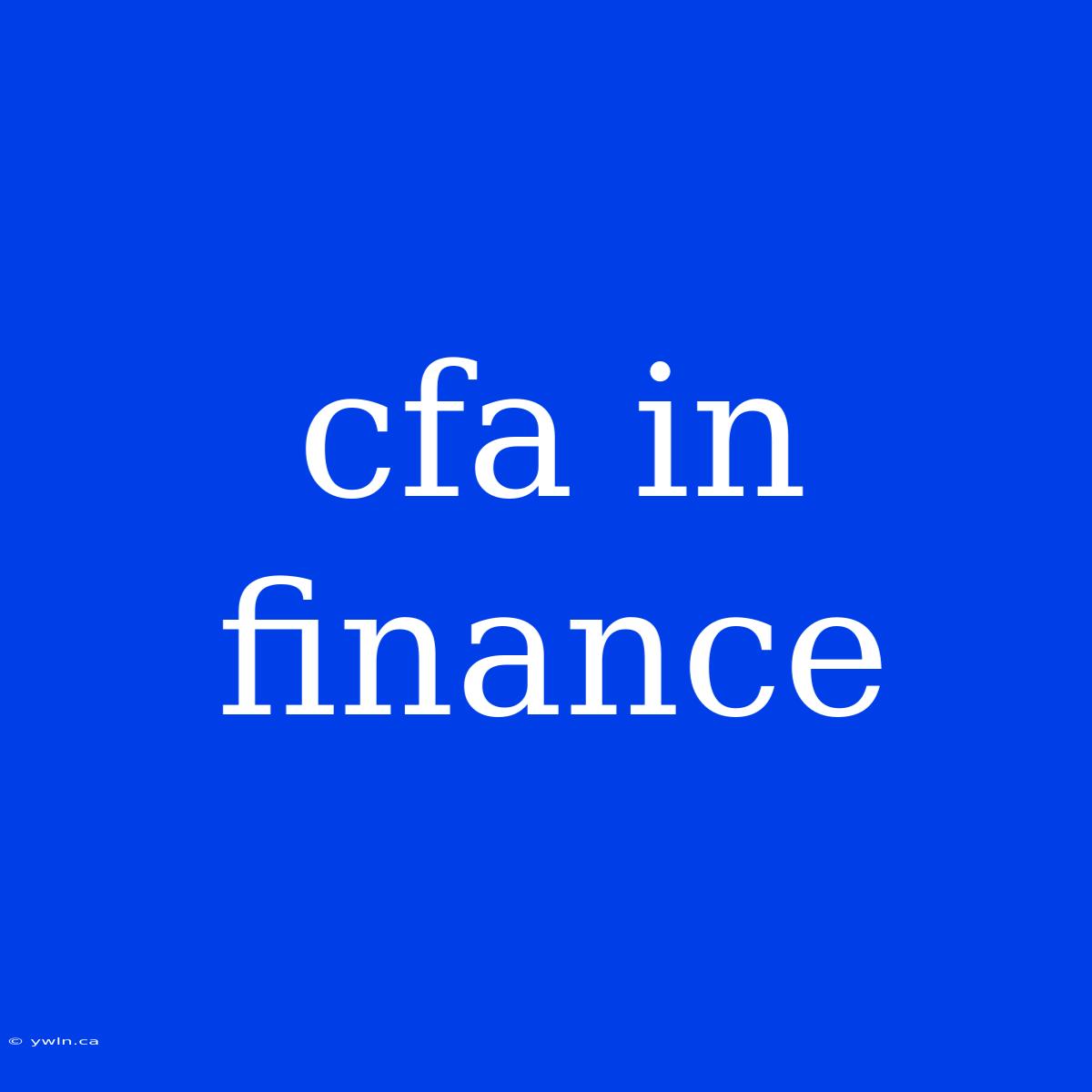Unlocking the Doors to Finance: Demystifying the CFA Charter
What is the CFA Charter and why should you care? The Chartered Financial Analyst (CFA) designation is a globally recognized credential that signifies advanced knowledge, skills, and ethical standards in the finance industry. It's more than just a certificate; it's a testament to a commitment to excellence, opening doors to opportunities and establishing you as a leader in the financial world.
Editor Note: The CFA charter is a challenging but rewarding journey, leading to enhanced career prospects and professional recognition in the financial industry. This article will delve deeper into the CFA program, outlining its key components, benefits, and the path to achieving this coveted designation.
Our Analysis: We have compiled this guide by analyzing the CFA Institute's official resources, reviewing insights from industry professionals, and studying the experience of CFA charterholders. This in-depth analysis aims to provide a comprehensive understanding of the CFA program, its relevance in today's dynamic financial landscape, and its impact on your career trajectory.
Key Aspects of the CFA Program
| Key Aspect | Description |
|---|---|
| Rigorous Curriculum | Covering investment tools, valuation, portfolio management, and wealth planning, the CFA curriculum is designed to provide a holistic understanding of the financial landscape. |
| Practical Application | The CFA program emphasizes real-world applications, encouraging candidates to develop critical thinking and problem-solving skills. |
| Ethical Standards | The CFA Institute's Code of Ethics and Standards of Professional Conduct are integral to the program, promoting ethical decision-making and responsible financial practices. |
| Global Recognition | The CFA designation is recognized worldwide, opening doors to opportunities in various financial sectors across the globe. |
CFA Program: Unlocking the Potential
CFA Curriculum: A Comprehensive Foundation
The CFA curriculum is divided into three levels, each demanding significant commitment and dedication.
- Level I: Foundation in investment tools, financial reporting, and quantitative analysis.
- Level II: Application of financial concepts, portfolio management, and equity valuation.
- Level III: Advanced portfolio management, wealth planning, and ethical considerations.
Practical Application: Bridging Theory and Reality
The CFA program prioritizes practical application of learned concepts, encouraging candidates to analyze real-world case studies and develop their analytical and problem-solving skills.
Ethical Standards: Guiding Principles for Success
The CFA Institute's Code of Ethics and Standards of Professional Conduct serve as a cornerstone of the program. These principles emphasize integrity, objectivity, and professional responsibility, instilling ethical decision-making within the financial industry.
Global Recognition: A Passport to Opportunities
The CFA designation is recognized and valued by employers worldwide, opening doors to various roles within the financial sector, such as:
- Investment Analyst: Conduct research and analysis on investment opportunities.
- Portfolio Manager: Manage investments on behalf of clients, building and maintaining their portfolios.
- Financial Advisor: Provide financial advice to individuals and families.
FAQs about the CFA Charter
FAQ
| Question | Answer |
|---|---|
| What are the prerequisites for taking the CFA exams? | A bachelor's degree is required, along with four years of professional work experience in finance. |
| How long does it typically take to complete the CFA program? | On average, it takes 3-5 years to complete the three levels of exams. |
| What are the costs associated with the CFA program? | The costs include exam fees, study materials, and potential membership fees. |
| How can I prepare for the CFA exams? | Dedicated study time, structured preparation programs, and practice exams are key to success. |
| Is the CFA designation worth the investment? | The CFA designation is highly regarded and opens doors to lucrative career opportunities and professional advancement. |
Tips for Pursuing the CFA Charter
- Start Early: Begin studying and preparing for the CFA exams early to maximize your chances of success.
- Develop a Study Plan: Structure your study time effectively, dedicating specific hours to each subject area.
- Utilize Study Resources: Make use of the CFA Institute's official study materials, practice exams, and online resources.
- Join Study Groups: Engage with other candidates through study groups for peer support and shared learning.
- Seek Mentorship: Connect with experienced CFA charterholders for guidance and insights.
Summary: The CFA Charter: A Journey to Excellence
Pursuing the CFA designation is a challenging but worthwhile journey. It's an investment in your professional development, equipping you with the knowledge, skills, and ethical foundation to thrive in the dynamic world of finance. The CFA charter is more than just a credential; it's a commitment to excellence that will open doors to a fulfilling and rewarding career in the financial industry.

